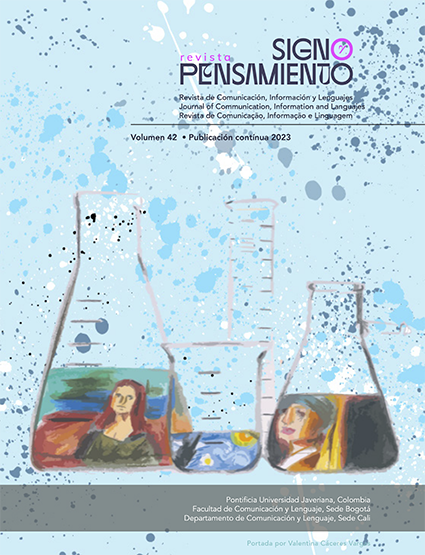Resumo
Com base na teoria da informação matemática de Shannon (MIT) e em algumas sugestões de Luciano Floridi sobre os desafios da revolução tecnológica, este artigo investiga os efeitos epistêmicos de ambientes redundantes. Para atingir esse objetivo, os conceitos de informação e redundância da TMI são revisados e, em seguida, relacionados à figura literária do corvo de Poe. Em um primeiro momento, a TMI é apresentada e as informações são analisadas em termos de sua transmissibilidade. Em seguida, o problema da informação é reconfigurado no contexto dos algoritmos da plataforma digital e a personalização do conteúdo é vinculada à redundância. Em seguida, são propostos os conceitos de espaços não informativos e espaços epistemicamente redundantes para explicar as condições de homogeneidade geradas por ambientes hiperpersonalizados. Por fim, é feita uma pequena proposta com relação à medição da redundância.
Bächtiger, A., Dryzek, J. y Mansbridge, J. (2018). Deliberative Democracy: An Introduction. En A. Bächtiger (ed.), The Oxford Handbook of Deliberative Democracy (pp. 1-32). Oxford Academics. https://doi.org/10.1093/oxfordhb/9780198747369.013.50
Bozdag, E. (2013). Bias in algorithmic filtering and personalization. Ethics and Information Technology, 15, 209-227. https://doi.org/10.1007/s10676-013-9321-6
Chibey, T. y Silva, J. (2021). Virtudes y vicios epistémicos: una mirada desde la epistemología social a la información y la participación ciudadana en los medios digitales. THÉMATA. Revista De Filosofía, (64), 79-101. https://doi.org/10.12795/themata.2021.i64.04
De Brasi, L. (2017). Knowledge as a social kind. Unisinos Journal of Philosophy, 18(3), 130-139.
Dourish, P. (2016). Algorithms and their others: Algorithmic culture in context. Big Data & Society, 3(2), 1-11. https://doi.org/10.1177/2053951716665128
Du, S. y Gregory, S. (2016). The Echo Chamber Effect in Twitter: does community polarization increase? En H. Cherifi, S. Gaito, W. Quattrociocchi y A. Sala (eds.), Complex Networks and their Applications V, Complex Networks (pp 373-378). Springer. https://doi.org/10.1007/978-3-319-50901-3_30
Estlund, D. y Landemore, H. (2018). The Epistemic Value of Democratic Deliberation. En A. Bächtiger (ed.), The Oxford Handbook of Deliberative Democracy (pp. 113-131). Oxford Academics.
Floridi, L. (2010). Information: a very short introduction. Oxford University Press.
Floridi, L. (2011). The philosophy of information. Oxford University Press.
Floridi, L. (2014). The fourth revolution. Oxford University Press.
Floridi, L. (2015). The Onlife Manifesto. En L. Floridi (ed.), The Onlife Manifesto Being Human in a Hyperconnected Era (pp. 7-16). Springer.
Goldman, I. A. (2020). The what, why, and how of social epistemology. En M. Fricker, P. J. Graham, D. Henderson y J. N. Pedersen (eds.), The Routledge Handbook of Social Epistemology (pp. 10-20). Routledge .
Gurevich, Y. (2011). What is an algorithm? Microsoft Research.
Habegger, B., Hasan, O., Brunie, L., Bennani, N., Kosh, H. y Damiani, E. (2014). Personalization vs. Privacy in Big Data Analysis. International Journal of Big Data, 25-35.
Hendricks, V. y Hansen, P. (2016). Infostorm. Copernicus Books.
Kian, E. M., Clavio, G., Vicent, J. y Shaw, S. D. (2011). Homophobic and Sexist yet Uncontested: Examining Football Fan Postings on Internet Message Boards. Journal of Homosexuality, 58(5), 680-699. https://doi.org/10.1080/00918369.2011.563672
Makombe, R., Sinyode, B., Tladi, M. y Thambo, S. (2020). Affective economies of racism on social media: a critical analysis of selected South African white supremacist Facebook pages. Communicare. Journal for Communication Sciences in Southern Africa, 39(2), 75-92. https://journals.co.za/doi/epdf/10.10520/ejc-comcare-v39-n2-a4
Micheli, M., Lutz, C. y Büchi, M. (2018). Digital footprints: an emerging dimension of digital inequality. Journal of Information, Communication and Ethics in Society, 16(3), 242-251. https://doi.org/10.1108/JICES-02-2018-0014
Morales, U. R. (2018). El ciudadano digital. Fake news y posverdad en la era de Internet. Océano.
Nouri, L., Lorenzo-Dus, N. y Watkin, A.-L. (2021). Impacts of Radical Right Groups’ Movements across Social Media Platforms - A Case Study of Changes to Britain First’s Visual Strategy in Its Removal from Facebook to Gab. Studies in Conflict & Terrorism, 1-27. https://doi.org/10.1080/1057610X.2020.1866737
Paglen, T. (2019). Imágenes invisibles. laFuga. https://lafuga.cl/imagenes-invisibles/944
Pariser, E. (2011). The Filter Bubble. The Penguin Press.
Poe, E. A. (1884). The Raven. Harper & Brothers.
Powers, E. (2017). My News Feed is Filtered? Awareness of news personalization among college students. Digital Journalism, 5(10), 1315-1335.
Rodríguez, P. (2012). Historia de la información. Capital Intelectual.
Rodríguez, P. (2019). Las palabras en las cosas. Saber, poder y subjetivación entre algoritmos y biomoléculas. Cactus.
Rolin, K. (2020). The Epistemic Significance of Diversity. En M. Fricker, P. J. Graham, D. Henderson y J. N. Pedersen, The Routledge Handbook of Social Epistemology (pp. 158-166). Routledge.
Rooney, T. (2015). Shame and the virtual gaze: Supporting children’s encounters in online worlds. Emotion, Space and Society, 16, 21-27. https://doi.org/10.1016/j.emospa.2015.06.003
Shannon, C. E. y Weaver, W. (1949). The Mathematical theory of communication. The University of Illinois Press.
Smith, G. y Setälä, M. (2019). Mini-Publics an Deliberative Democracy. En A. Bachtiger, J. Dryzek, J. Mansbridge y M. Warren (eds.), The Oxford Handbook of Deliberative Democracy (pp. 1-8). Oxford University Press.
Sunstein, C. R. (2017). #Republic. Divided Democracy in the Age of Social Media. Princeton University Press.

Este trabalho está licenciado sob uma licença Creative Commons Attribution 4.0 International License.
Copyright (c) 2024 Tamara Jesús Chibey Rivas, Jorge Francisco Silva


